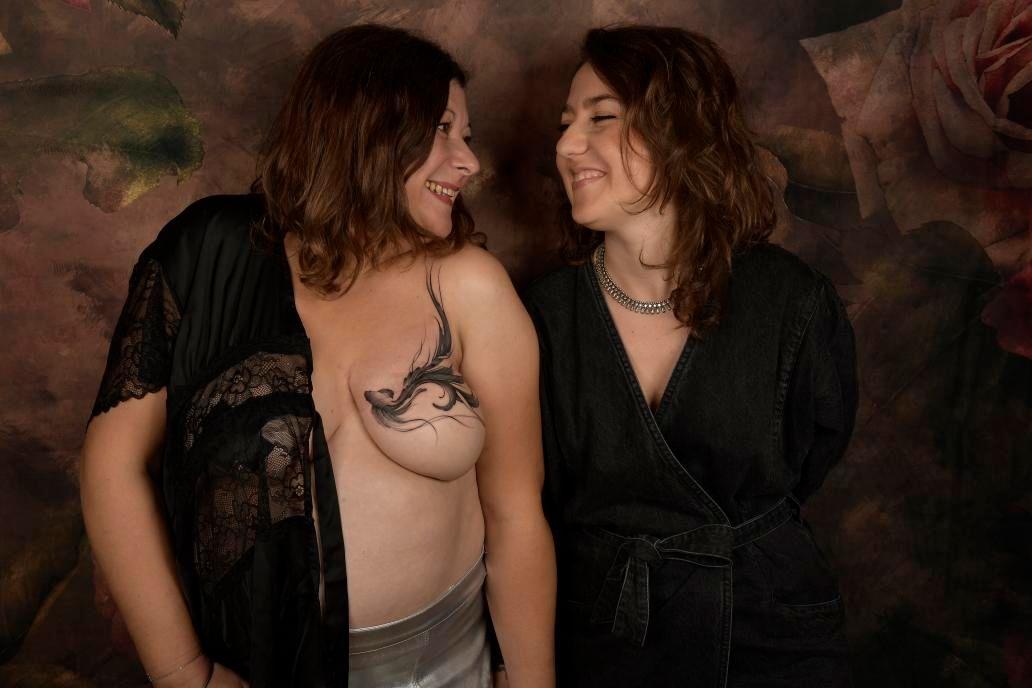As the first case of cancer for women, breast cancer affects one in eight women in France. If the vast majority survives, it inevitably leaves physical and psychological scars – which some, like Sophie, decide to heal through ink.
Bordeaux, October 2023. For Breast Cancer Awareness Month, the association Soeurs d’Encre organized the eighth edition of Rose Tattoo – a convention where 80 volunteer female tattooists gathered in a private room of a hotel to give their partner, a woman cured of breast cancer, a second breath of life. Among the duo, there were Sophie Quiles, 51 years old, a medical secretary, and her young tattoo artist, Cyd. Through the sound of the dermographs, Cyd tattooed Sophie’s deteriorated breast. In the room, there were no mirrors at all. Sophie and the others had to patiently wait to see the results.
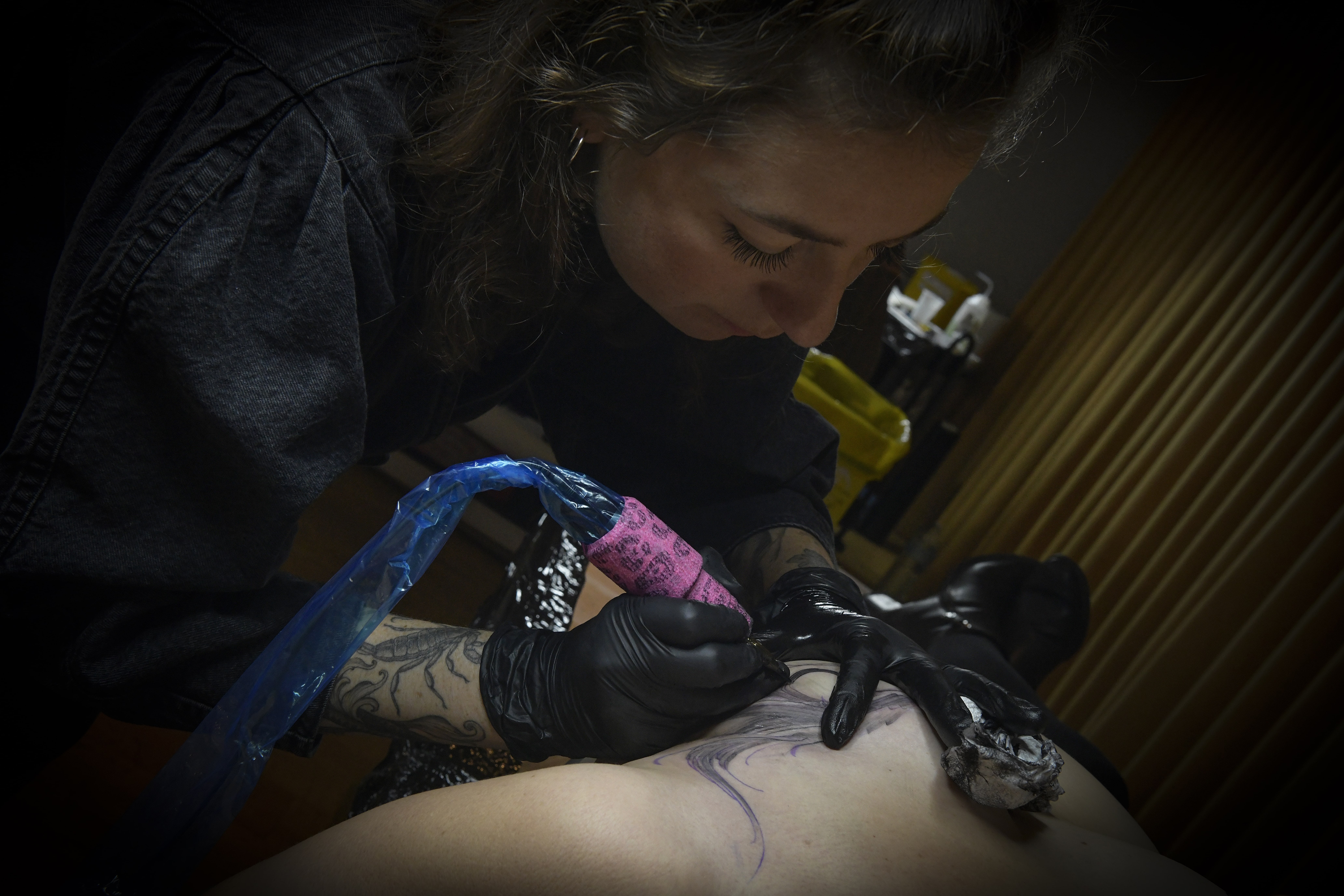
A few hours later, when the tattoos were done, the teams stood in line and each, in turn, went in front of a photographer. They brought a mirror and finally, they could discover their tattoos. The photographer captures this unique moment. When it was Cyd and Sophie’s turn, the emotion was intense. They kept crying and kissing and thanking each other. Sophie was over the moon: “The tattoo seemed to have always been a part of me. I could not see myself without it.” Years after the disease, she could make a fresh start thanks to a tattoo – thanks to ink therapy.
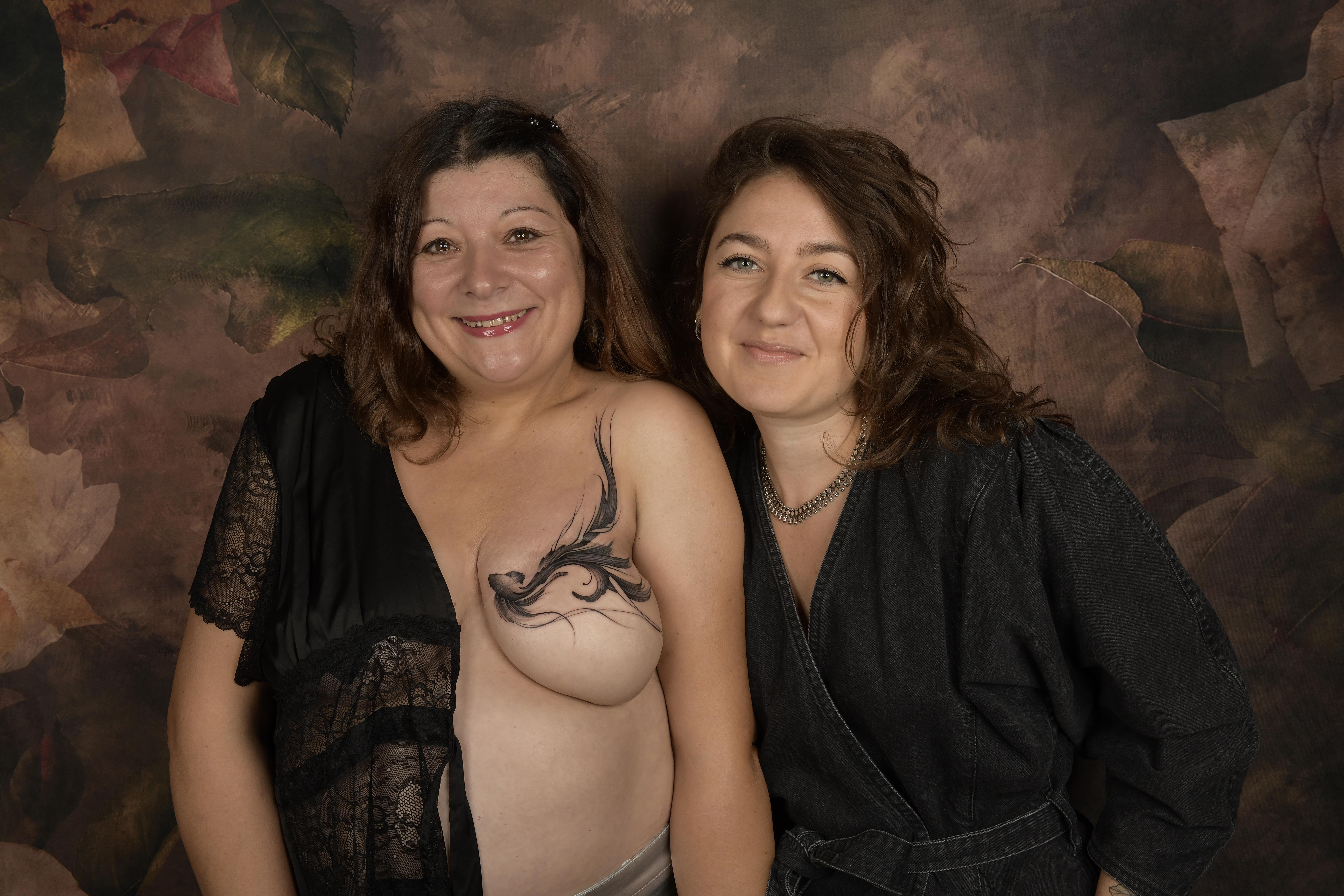
“The cancer of intimacy”
2020. Under the shower, Sophie felt a lump over her left breast. She felt tired and her voice was hoarse. “I knew what it was. But I deluded myself”, she recalled on the phone.
After a few examinations, on December, 17th 2020, Sophie learned she had breast cancer – the invasive lobular carcinoma (ILC) type. It accounts for 5-15% of breast cancers. Everything speeded up. “I was in my car, driving home, and I cried. I cried, I cried.” She told the news to her children after Christmas and New Year. “I did not want to ruin the celebrations. We were in bed when I said I have breast cancer. I immediately reassured them, especially about death. When you think about cancer, death is inevitable. But I told them ‘I won’t die. I will fight. Because I’m your mum and I want it to continue. I don’t want it to stop tomorrow.” Her children would be her strength to beat the cancer.
Quickly after the first chemo sessions, Sophie started to lose her hair and she shaved her head. As she refused to see herself bald, she immediately put on a wig. Hair loss was the first step towards the feeling of feminity loss – which would then focus on the loss of her breast.
In France, in 2023, there were more than 61,200 new cases of breast cancer. According to Camille Lebreton, a psychologist in Paris, breast cancer is the “cancer of intimacy” – that is to say it affects women’s intimate areas and their sense of feminity, especially through the mastectomy where the tumor and sometimes the breast are removed.
On January 25th, 2021, Sophie’s lump measured eleven centimeters – seven more than at the beginning of her cancer. Her left breast has been removed. This operation violently affected Sophie. She said:
I used to have a large breast. It was the first thing men looked at. I felt mutilated. Sometimes, I even thought of myself as a freak. Cancer stole my feminity.
For a while, she refused to see herself in a mirror. And even if the breast implant helped her to recover her feminity. She felt something missed – a tattoo.
Healing in and out scars
“You realize there are people concerned about what you’ve been through. There are people who act so you can start over and feel comfortable in your own skin again”, Sophie said weeping on the phone, as she remembered her first encounter with the association Soeurs d’Encre created in 2017.
Sophie always knew she wanted to cover her scars with a tattoo and the association helped her make her dream come true. Based on her project, Soeurs d’Encre put her in contact with Cyd – a tattoo artist based in Saint-Denis, near Paris. Met at her modern style shop, La Marque, while she was carefully tattooing her customer, Cyd said she received a lot of requests for interviews about breast cancer.
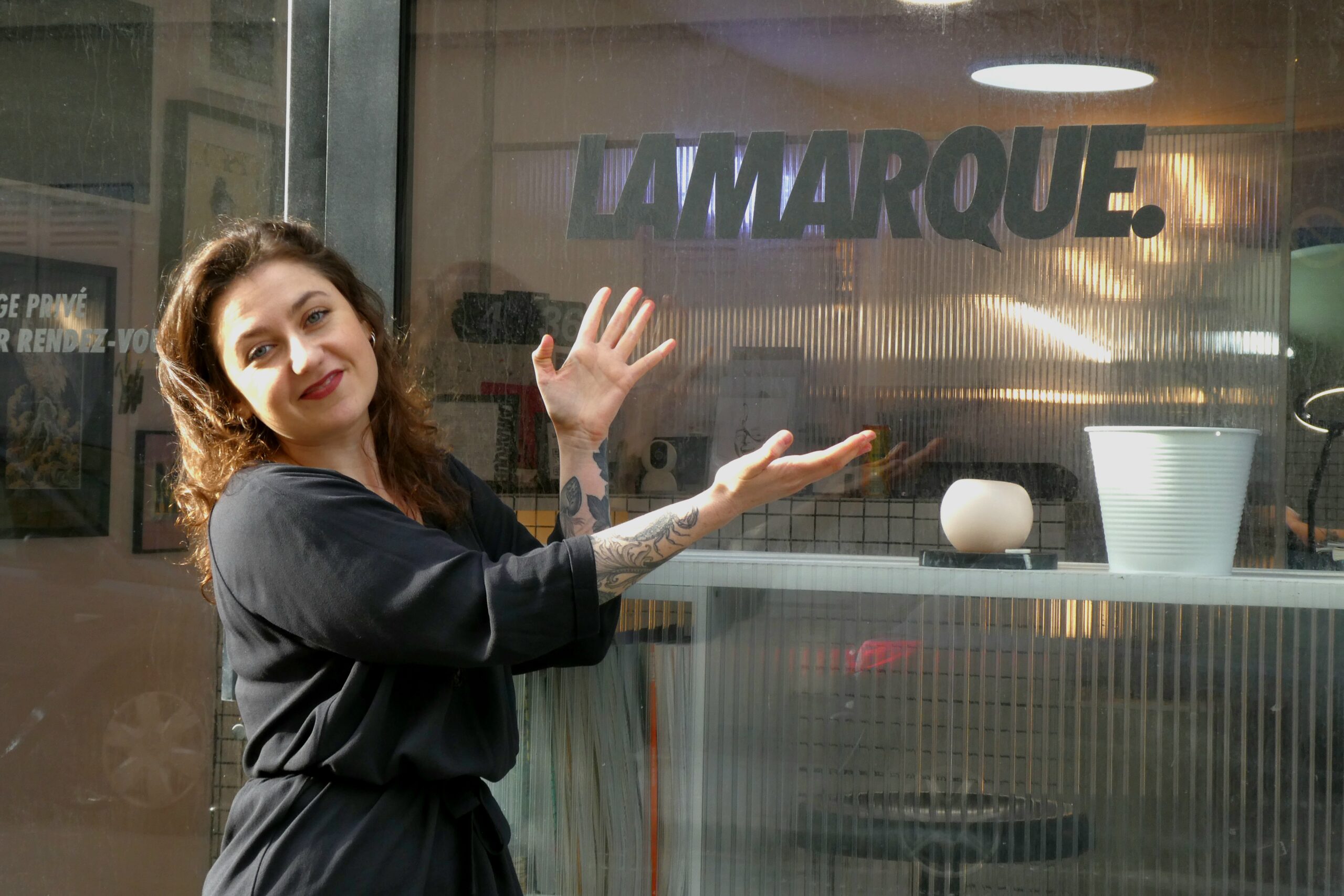
During her break, on the floor below, through the sound of her colleagues’ dermographs, Cyd said she joined the association as a volunteer a year ago. She felt concerned about breast cancer and wanted to help while doing her job. The association – with psychologists and dermatologists – trained her online and explained the disease and the difficulties overcome by women like Sophie.
Cyd and Sophie spent weeks discussing her project, defining what is achievable on her cicatrized skin and what is not. They finally agreed on a koi carp standing for courage and love in Japanese culture. “I didn’t want flowers like everyone else. I’m a maverick! I don’t like doing like others,” Sophie said, laughing.
The scars reminded me of the illness. Now, it seems as if I have never had cancer. If a woman hesitates, I would strongly recommend her to have drive. It would only bring a positive side.
Ink therapy, designated as the “artistic tattoo of reconstruction” by Soeurs d’Encre helps women to reconstruct their image, their feminity, and their opinion of themselves. At La Marque, Cyd remembered another customer who had a strong complex with her breasts and could no longer have sexual relations with her husband. But the tattoo helped her overcome this complex. According to Cyd, ink therapy puts an end to cancer. It is the art of “doing something harmonious and beautiful on painful scars.”
Yet, tattoos are artistic pieces, and only the process is therapy. Cyd said: “We are not therapists. We are artists. And if the person decided to give a symbolic and therapeutic aspect to it, we did it!” Camille, the psychologist, agreed and gave a general approach to tattoos: “A tattoo can mean anything: a new start, a victory, a symbol, a recall, anything that reminds us of what we’ve been through. I myself got a tattoo after a difficult period in my life.”
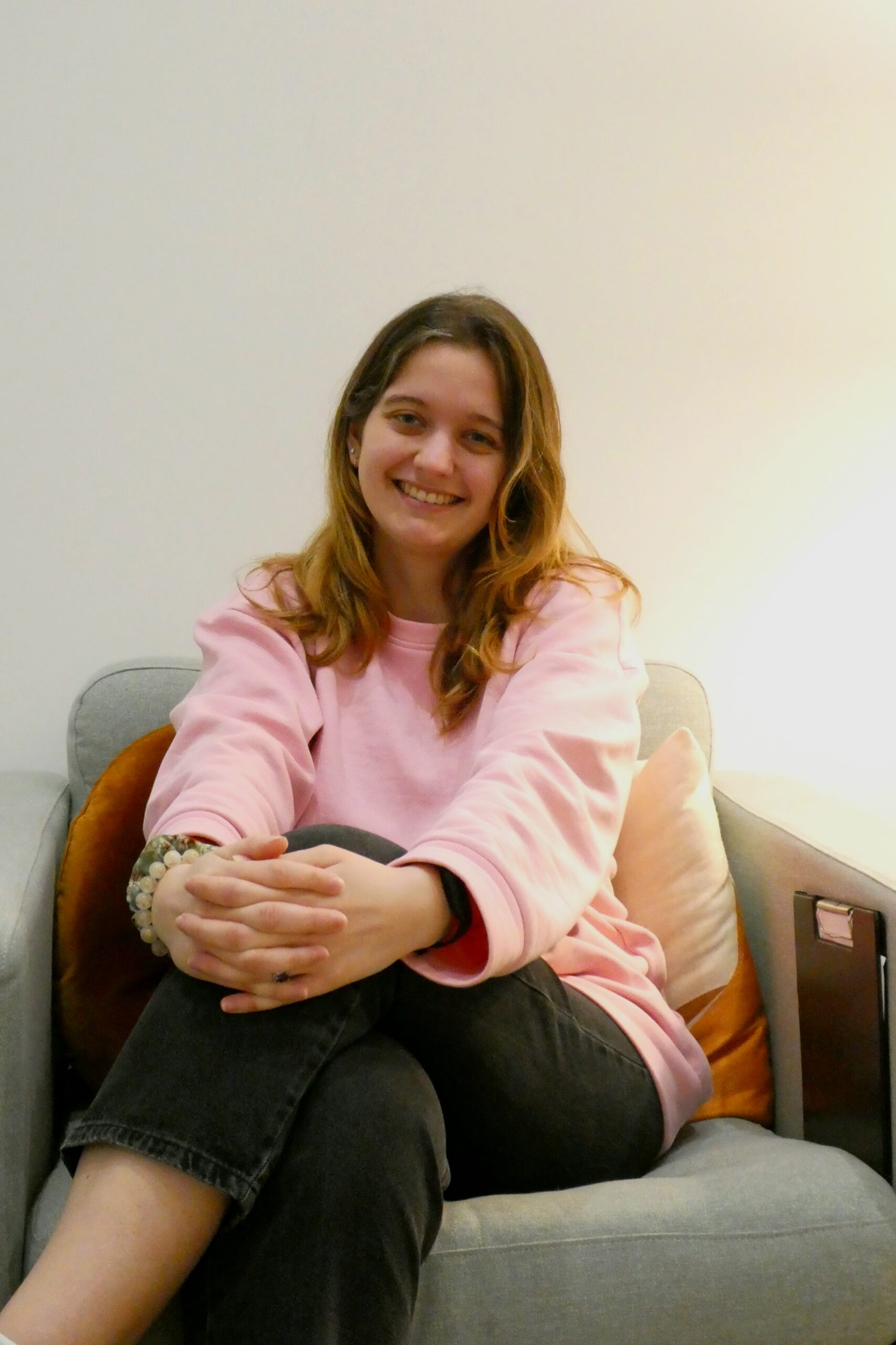
Women with breast cancer struggle with stress, and fear of death. Their relationship with feminity is disrupted, and their body is destructured. “How can I live a normal life after that?” Camille said. Therefore, the therapy side of the process comes from the pain felt while being tattooed. “The person retakes the pain they endured. The tattoo fixes the damaged body. They are now sisters of experience, sisters of illness, and soeurs d’encre.”
A connection stronger than ink
A year later, Sophie and Cyd are still in contact. “We made it together. What she did for me is incredible and unique”, Sophie said smiling. “She is the one who did everything. I was only the tool”, corrected Cyd, modestly. Their relationship is stronger than ink.

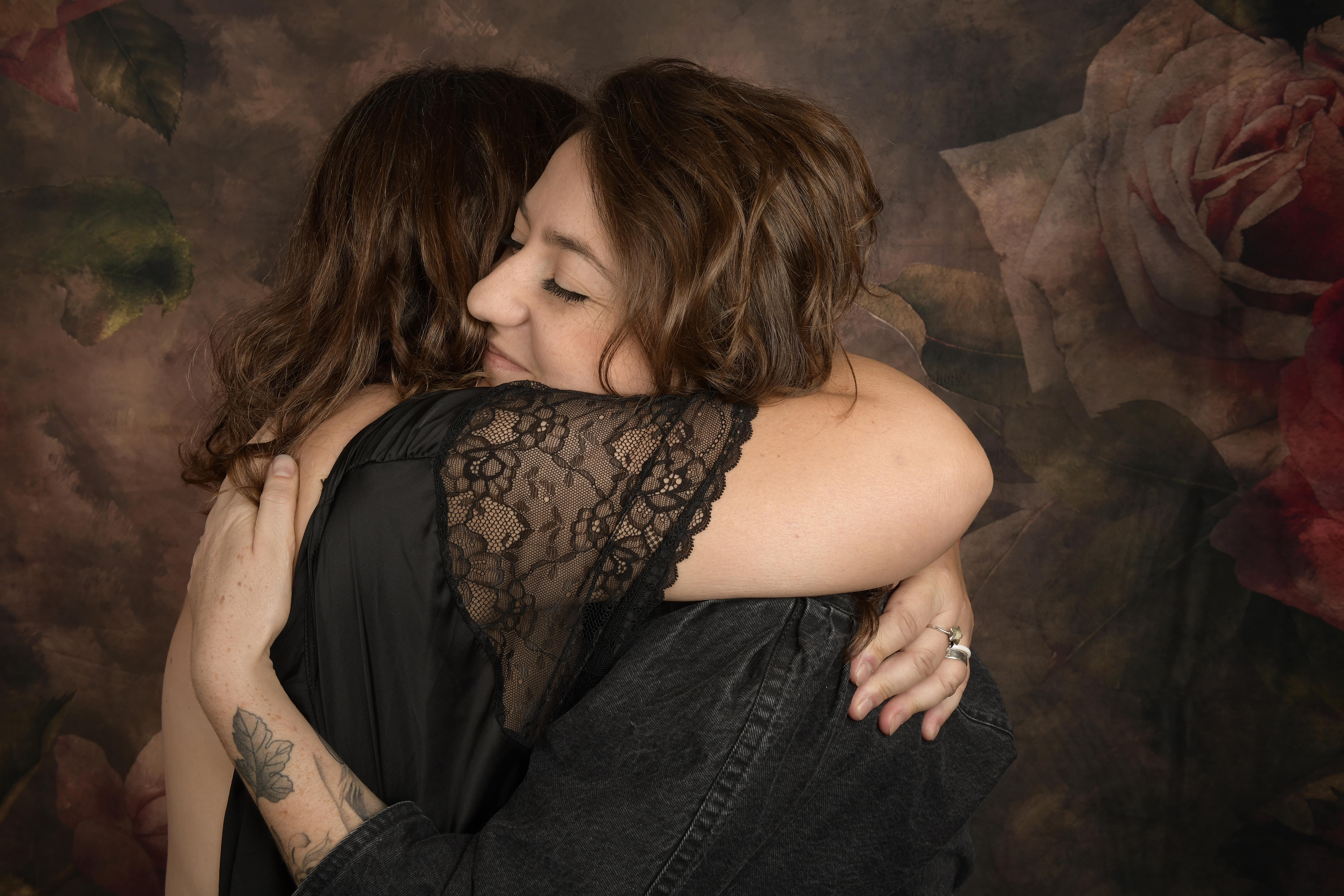
Today, ink therapy is not recognized as a medical process and is not refunded by the French social security system – despite its therapy benefits. But associations like Soeurs d’Encre, fight for its recognition, as it helped Sophie and thousands of women to live a normal life again, – to feel beautiful again.


